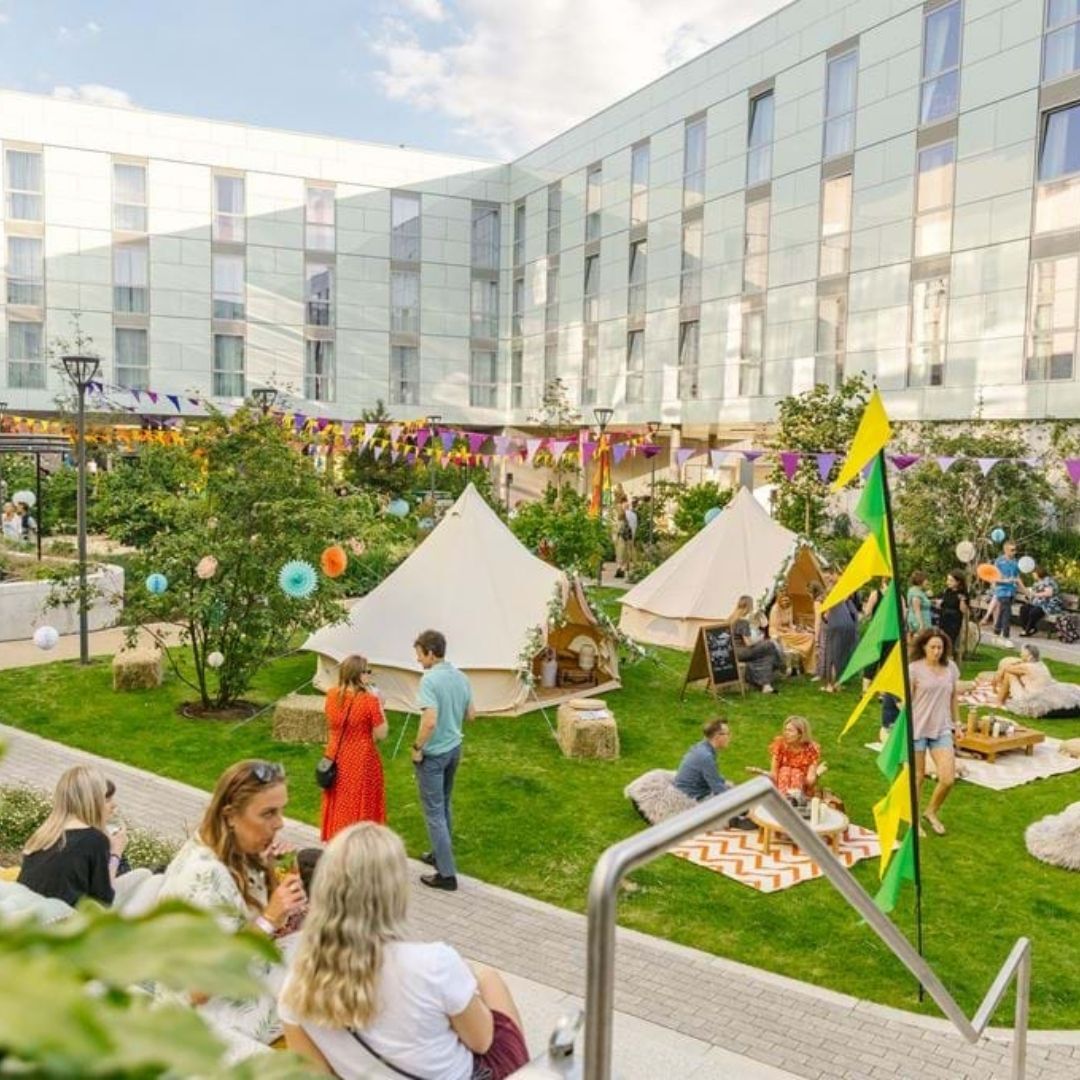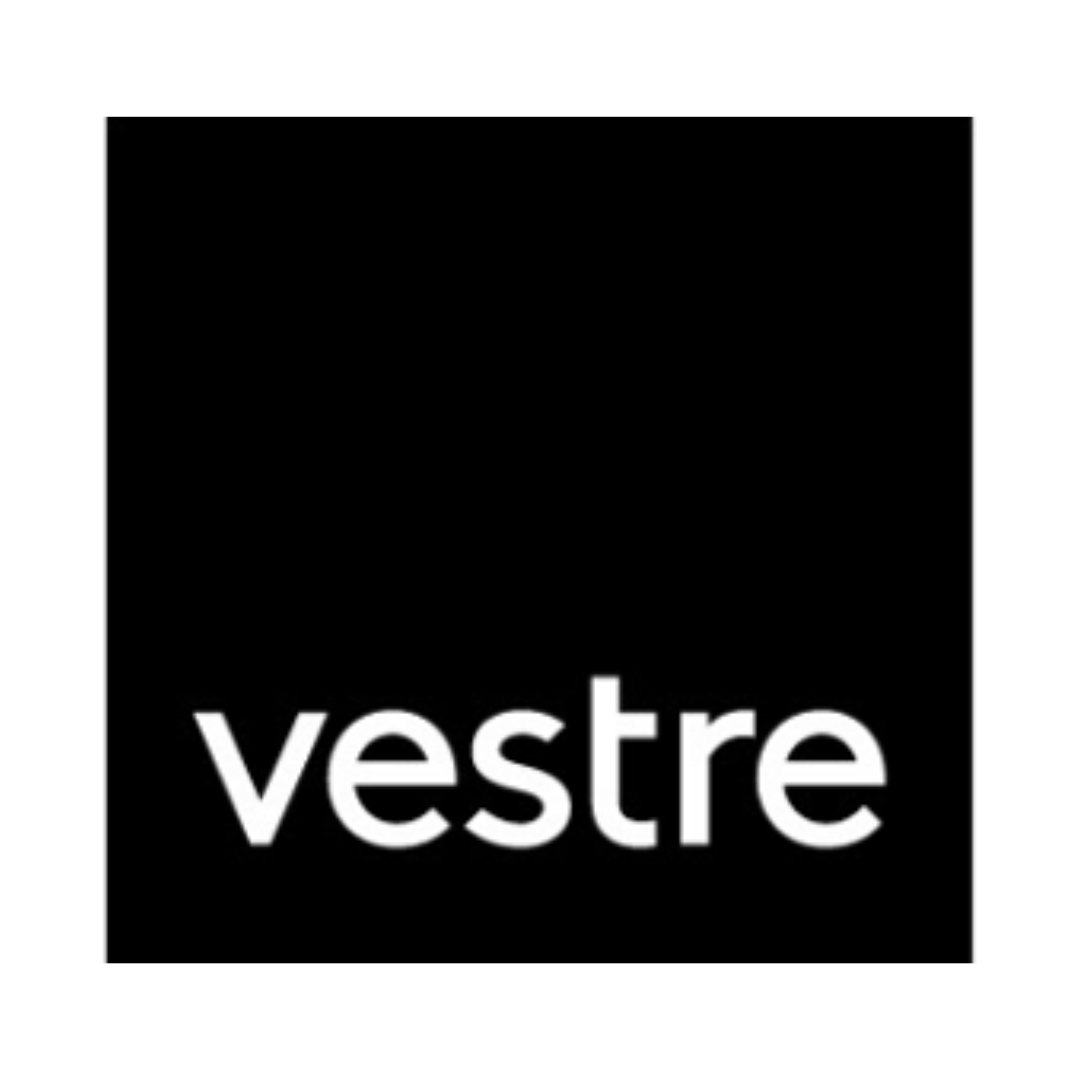Project showcase
Eddington Hotel, Cambridge, for edyn, with dRMM, Robert Myers Associates and AvroKo

Eddington Hotel is part of Cambridge University’s 150-hectare Eddington development. The 180-key Turing Locke apart-hotel and the 150-room Hyatt Centric hotel create a courtyard configuration inspired by academic quadrangles, featuring a vibrant garden at its core. This space, designed by dRMM, serves as a communal area for hotel residents and the wider community, promoting relaxation.
Who is on the project team? (designer, consultants, etc)
dRMM - Architect
Gardiner and Theobald - Project Managers
Tower Eight - Cost Consultant
Applied Energy - MEP
Manhire Associates - Structural Engineer
AECOM - Planning
AvroKo - Interior Designer
Robert Myers Associates - Landscape
Describe the context of this project, its neighbourhood and people.
This highly unusual project co-locates two hotels in one distinctive building that creates a community focal point for Eddington, the University of Cambridge’s sustainability-led quarter. This new neighbourhood, housing 3000 homes and providing accommodation for 2000 post-graduates, along with academic, research, and community facilities, marks the completion of the masterplan’s first phase. The hotel stands adjacent to the commercial hub of Market Square, and also Eddington Avenue, location of key community and civic buildings such as Storey´s Field Center and University of Cambridge Primary School. The 180-key Turing Locke apart-hotel and the 150-room Hyatt Centric hotel are integrated into a courtyard configuration inspired by academic quadrangles, featuring a vibrant garden at its core. This inviting space, designed by dRMM, serves as a communal area for hotel residents and the wider community, promoting relaxation, work, and socialisation. Contrasting with the urban surroundings, the garden boasts lush woodland planting, open lawns, dining terraces, and entertainment spaces. The landscape design cleverly connects the courtyard to the public realm, emphasising accessibility and openness. The undercroft spaces, with reflective ceilings, provide glimpses of the planted garden from surrounding streets, leading to a network of paths catering to different user groups. This unexpected oasis enriches the community experience, offering a versatile outdoor extension of the hotel’s ground floor and fostering connection among residents and visitors alike.
How does this public space bring people together, encourage inclusivity, and make a positive environmental impact to the wider place? How is the community engaged in the project?
- Inclusive Design: The public space is designed to be accessible to all, regardless of physical abilities. This includes gently sloping ramps, ample seating for resting and clear signage.
- Community-Centric Approach: Turing Locke’s public space has been developed with input from the local community including a town hall meeting where residents, businesses, and other stakeholders shared their ideas ensuring the result reflects the desires and values of users.
- Programmes and Events: The public space plays host to a varied event programme aimed at bringing the community together. Since it´s opening the hotel has held over 100 publicly open events, many of them free, which include outdoor cinema, floristry workshops, yoga classes and a regular book club.
- Environmental Sustainability: The design and maintenance of the public space prioritises environmental sustainability: low embodied energy; natural materials such as reconstituted stone and timber decking; green spaces with native plants that support local biodiversity; creation of new habitats and a Sustainable Urban Drainage system to manage rainfall and mitigate flooding.
- Community Engagement and Participation: Residents and local businesses actively participate in the upkeep and programming of the space, including volunteering for maintenance, community gardening initiatives, and partnerships with local organisations for ongoing activities.
- Promotion of Social Connections: The layout of the public space is designed to encourage social interaction. This includes seating areas conducive to conversation; communal spaces for gatherings; and interactive artwork by Fiona Curran, inspired by local archeology, that prompts engagement and discussion among visitors.
Please share any data or figures that support your entry about how this public space or landscape intervention has made a positive social or environmental impact, for example biodiversity, increased dwell time, flood or drainage mitigation, wellness or safety or other ecosystem services
As a crucial component of the sustainable Eddington development by the University of Cambridge, this project focuses on energy efficiency, earning a BREEAM Excellent rating. Notable features include Air Source Heat Pumps with heat recovery, 555 photovoltaic solar panels generating 10% of energy, and heat recovery ventilation, contributing to a 20% carbon reduction. The public realm, designed as an urban oasis, prioritises well-being through calming, textured planting and water features. Children have reacted positively to the character of the garden and visit the courtyard space on a regular basis for informal play on their way to and from school. Many of the hotel reviews refer to the positive draw of the garden in this context The initiative addresses biodiversity erosion, significantly increasing the site’s biodiversity with bird and bat boxes, bug and bee hotels. A diverse, climate-resilient planting design, featuring robust species, enhances urban wildlife habitats. Seasonal interest, muted colour palettes, and evergreen and deciduous flora contribute to the garden’s character. The landscape design ensures permeability and water management, with semi-permeable paving, sustainable drainage, and an on-site water recycling system connecting to neighbourhood´s sustainable urban drainage system. The implementation of a Site Waste Management plan during construction achieved a remarkable 99.98% diversion from landfill, emphasising strategies such as prefabrication and repurposing inert waste.This intervention not only exemplifies sustainable practices but also promotes social well-being and ecological resilience. The project showcases positive impacts, including energy efficiency, biodiversity enhancement, and waste reduction, aligning with the ethos of a regenerative future for Eddington.
Festival of Pineapples
24-26 February 2026
Pineapples prize giving night
April
Pineapples at Festival of Place
10 June 2026
© The Pineapples - Tweak Ltd. 124 City Road, London, EC1V 2NX. Tel: 020 3326 7238




